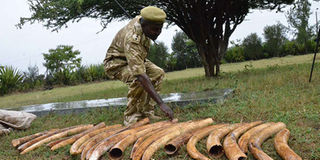Illicit finance flows must cease to protect our wildlife heritage

Elephants tusks impounded in Laikipia. Wildlife crime is a threat to wildlife. PHOTO | FILE | NATION MEDIA GROUP
What you need to know:
The Financial Action Task Force (FATF) recently showed interest in countering money laundering from wildlife crime.
While this expression of interest doesn’t go far enough for it is not action yet, it’s a step in the right direction.
- Kenya does not need to wait for FATF; it can enact laws, establish institutions and collaborate with willing partners to interrupt financial flows from wildlife crime.
It is not a good time to be part of the Kenyan wildlife. In the past 10 years alone, Kenyan flora and fauna have been decimated at a rate that had not been seen before.
Between 2005 and 2017, some 2,140 elephants were killed by poachers for their tusks — half of these in just three years. Poaching has also driven rhinos to the edge of extinction. Giraffe population has reduced by 40 per cent over three decades due to extensive poaching for their meat and skin. Grevy’s zebra are down to just eight per cent of their number a few decades ago.
EXTINCTION
Plants have not escaped this carnage too, with 79 species endangered and hanging on the edge of extinction. Sandalwood, for instance, is one of the most trafficked plant in Kenya, if not the world. Its population in Kenya has fallen so low that it’s likely there will be none left if the illegal trade, which nets about $23 billion per year globally, is not stopped.
The effect is that Kenya’s natural wealth continues to dwindle. There is a saying I like, that for a sinner, Hell begins when one is still alive. The suffering doesn’t wait till the hereafter but kicks off here.
It is not just the future generations who will suffer from not inheriting the natural wealth their ancestors held in trust for them, but also the current one. Tourism earns Kenya the most forex, money that is used to import things such as medicines and medical equipment. Without a rich wildlife, this industry would collapse, the economy suffer and people lose jobs.
In addition, illegal wildlife trade presents an immediate danger to us. In his paper, “Threat Finance”, published as part of the Assessing Revolutionary and Insurgent Strategies (Aris) project of the US Special Operations Command, Dr Timothy Wittig goes into lengthy detail into how trafficking is used to finance insurgencies and terrorism.
ATTACK VECTORS
There have been many reports in Kenya that the Al-Shabaab is involved in poaching. The Los Angeles-based Elephant Action League says its investigations uncovered the involvement of Al-Shabaab in wildlife poaching and international trafficking.
While this connection has not been definitively proven, it would be surprising for such an organisation not to have noticed the immense funding potential that poaching presents. After all, the wildlife is in the very same wilds where the terror organisation operates. Poaching, therefore, directly funds violence against Kenyans and must be stopped.
Cognisant of the seriousness of wildlife crime, there has been a myriad anti-poaching initiatives established to counter the threat. These have been ran by such organisations as the WWF, the Basel Institute on Governance, Save the Rhino and government agencies. They range from the non-Kinetic ones such as advocacy and education, technical support to Kinetic methods such as direct and terminal action against poachers by force of arms.
All of these methods are designed to attack specific nodes in the illegal wildlife trade. But while they have been successful, it’s always important to keep taking the fight to the poachers by finding new and effective attack vectors.
INVEST HEAVILY
Because this trade is, ultimately, economic in nature, understanding and terminating the resulting illicit financial flows is critical in fighting it.
The Financial Action Task Force (FATF) recently showed interest in countering money laundering from wildlife crime. While this expression of interest doesn’t go far enough for it is not action yet, it’s a step in the right direction.
Kenya does not need to wait for FATF; it can enact laws, establish institutions and collaborate with willing partners to study, understand, map and ultimately detect and interrupt financial flows from wildlife crime. The United for Wildlife campaign, bringing together such heavyweights as the Royal United Services Institute (Rusi) and Standard Chartered Bank, is developing an Illegal Wildlife Trade Taskforce to develop strategies for fighting such crime. Kenya should invest heavily in this task force.
This is our wildlife. Others can help but the responsibility to protect it remains ours.
Mr Kuria is an anti-financial crime specialist. [email protected]





